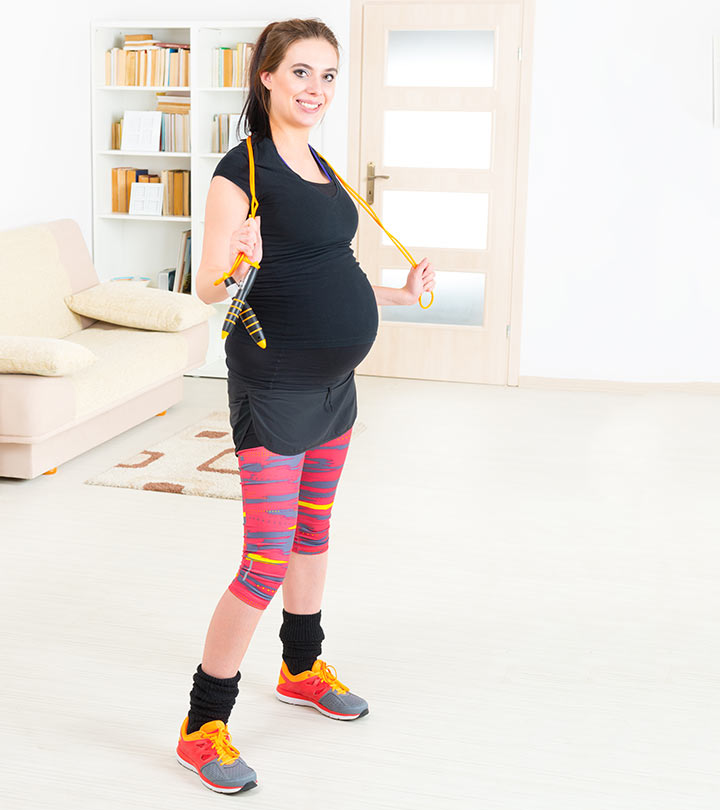Climbing is a great form of exercise for pregnant women, but it’s important to take the proper precautions to ensure both mom and baby’s safety. Unfortunately, there are some misconceptions about climbing during pregnancy and its potential risks. One of the most common questions expecting mothers have is whether climbing can cause a miscarriage.
The short answer is no, climbing cannot cause a miscarriage. While it’s true that activities such as rock climbing can be strenuous, leading to increased heart rate and blood pressure that could harm the fetus, there have been no scientific studies linking rock climbing to miscarriages.
That being said, pregnant women should always practice caution when engaging in any physical activity. Rock climbing can be risky if not done properly or if the woman is not strong enough or experienced enough in the sport. It’s best to get an experienced climber or instructor to help you out with your technique and safety measures so you don’t put yourself at risk of injury or harm.
In general, it’s best for pregnant women to stick with top-rope climbing rather than lead-climbing sine lead-climbing involves more risk and higher levels of difficulty. Additionally, avoid bouldering as this could result in trauma to your abdomen if you were to fall from a height.
Finally, always check in with your doctor before engaging in any physical activity during pregnancy—including rock climbing—to make sure it’s safe for you and your baby. Taking all these precautions will help ensure that you can safely enjoy rock climbing during your pregnancy!
Is Climbing Safe During Pregnancy?
Climbing during pregnancy can be safe, provided that certain precautions are taken. It is important for pregnant women to consult their doctor before engaging in any physical activity, especially a more strenuous activity such as climbing. It is also important to ensure that any climbing walls or routes used are free from hazards and properly maintained.
When climbing, it is important to take extra caution and avoid overexertion. It is advised that pregnant women avoid high risk maneuvers, such as lead climbing or bouldering. Top roping is the safest way to climb while pregnant, as it involves the least amount of risk. Additionally, proper technique should be used when tying in and belaying in order to reduce the chances of injury should a fall occur.
It is also important for pregnant climbers to pay close attention to their body and take regular breaks while climbing. Staying hydrated and eating regularly will help maintain energy levels and prevent exhaustion. Additionally, if there are any warning signs such as dizziness or shortness of breath, it is advised that the climber takes a break from climbing until these symptoms subside.
Overall, with proper precautions and care taen into consideration, climbing can be safely done during pregnancy for most women provided they have discussed it with their doctor first.

Risk of Miscarriage from Climbing Steps
No, climbing stairs does not cause miscarriage. In fact, moderate exercise such as walking is recommended for pregnant women in the first trimester. Stair climbing shuld be done with caution and it is best to avoid if you feel any discomfort or pain. If you are uncomfortable with climbing stairs, talk to your doctor about other forms of exercise that may be safer for you and your baby. Additionally, make sure to stay hydrated and take frequent breaks while climbing stairs. It is important to note that if you experience any vaginal bleeding or cramping while climbing stairs, you should stop immediately and contact your doctor right away.
The Effects of Climbing Stairs During Early Pregnancy
Climbing stairs dring early pregnancy is generally safe as long as the expecting mother climbs slowly and holds onto the railing for support. It is important to take it easy when climbing the stairs, as pregnancy increases your risk of dizziness or lightheadedness due to changes in your blood pressure. If you experience any discomfort, it’s best to stop and rest, or avoid the stairs altogether. Additionally, if the staircase is long and winding, it’s a good idea to take a break partway up. Stair climbing can be a great form of exercise in early pregnancy, but make sure you are taking all necessary precautions for your safety.
Lead Climbing During the First Trimester
No, it is not recommended to lead climb in your first trimester. Lead climbing involves a lot of dynamic movement that could potentially cause undue stress and strain on the abdominal muscles, which is best avoided during pregnancy. Also, depending on the type of rocks you are climbing and the way you are climbing them, there is a risk of falling or hitting your abdomen which could be dangerous for you and your growing baby. It is best to avoid leading while pregnant in the first trimester, particularly if you are new to lead climbing.
Climbing While Pregnant: How High Can You Go?
When pregnant, it is best to avoid climbing to altitudes higher than 8,500 feet above sea level for more than a few days. This recommendation is based on the Centers for Disease Control and Prevention (CDC) guidelines. Pregnant women should also avoid sleeping at altitudes higher than 12,000 feet, as this could lead to serious health risks for both mother and baby. At high altitudes, oxygen levels are lower which can cuse a variety of health issues. Altitude sickness can be especially hazardous to pregnant women as the symptoms may be similar to those of early labor. It is always best to consult with your doctor before engaging in any activity that involves climbing to high altitudes while pregnant.

Exercises to Avoid During Pregnancy
Exercises that are unsafe when pregnant include any activities that may cause trauma or strain to the abdomen, such as activities with jarring motions or rapid changes in direction. Examples of these exercises include deep knee bends, full sit-ups, double leg raises, straight-leg toe touches, and bouncing while stretching. Additionally, any activity that requires extensive jumping, hopping, skipping or bouncing should be avoided as well. It is important for pregnant women to listen to their bodies and take it easy during exercise – if a particular activity causes discomfort or pain, it should be discontinued immediately. If you are unsure about whether an activity is safe for you during pregnancy, it is best to consult your healthcare provider befoe starting it.
Risks of Physical Activity During Pregnancy and the Possibility of Miscarriage
Miscarriage is a heartbreaking event that can be caused by a number of different factors. In most cases, physical activity is not one of them. Research has not found any connection beteen moderate exercise and miscarriage. In fact, physical activity has been linked to improved health outcomes for pregnant women and their babies.
The most important thing for pregnant women to remember when it comes to exercise is to listen to their bodies and make sure they are not overexerting themselves. It is also important to avoid activities that pose a risk of falling or abdominal trauma such as contact sports, horseback riding, or high-impact aerobics. If you have any questions or concerns about the safety of any activity while pregnant, consult your doctor or obstetrician.
Causes of Miscarriage in Early Pregnancy
Miscarriage in early pregnancy can be caused by a variety of factors, including chromosomal abnormalities, hormonal imbalances, or structural abnormalities in the uterus. Chromosomal abnormalities are often the most common cause of first trimester miscarriage, and occur when there is an imbalance in the number of chromosomes present in the fetus. This can lead to abnormal development which can cause the pregnancy to miscarry. Hormonal imbalances, such as an excess or deficiency of crtain hormones, may also be a factor. Uterine structural problems such as fibroids or an abnormally shaped uterus can also lead to miscarriage. Additionally, lifestyle factors such as smoking, alcohol consumption and exposure to certain toxins may increase your risk of experiencing a miscarriage. Ultimately, it is important to speak with your healthcare provider if you have any questions or concerns about miscarriage during early pregnancy.
Can Excessive Jumping Increase the Risk of Miscarriage?
No, jumping a lot does not typically cause miscarriage. Miscarriage is usually caused by chromosomal abnormalities in the developing baby, or an underlying medical condition in the mother, such as diabetes or high blood pressure. Rarely, trauma to the abdomen or complications with the placenta can cause a miscarriage; however, jumping and other activities of a healthy pregnant woman do not. If you are worried about your risk of miscarriage due to your activity level during pregnancy, talk to your doctor.

The Effects of Bumpy Roads on Pregnancy
No, bumpy roads cannot affect pregnancy. While some pregnant women may feel uncomfortable whie riding in a car on a bumpy road, there is no evidence that suggests that hitting bumps in the road can induce labor or otherwise negatively affect a pregnancy.
Bumps in the road can cause discomfort for pregnant women due to the increased pressure on their abdomen, but this discomfort is usually temporary and doesn’t cause any long term damage or changes to the health of the mother or baby. It is important to note that sudden jolts during car rides, such as when driving over potholes or speed bumps, should be avoided if possible as they can cause short-term pain for pregnant women. Therefore, it is best to drive carefully and at a slow speed when traveling over uneven terrain.
While bumpy roads won’t induce labor or have any serious negative effects on pregnancy, it’s important to remember that all pregnant women are different and should listen to their body when they are feeling uncomfortable during a car ride. If necessary, ask your doctor for advice on how best to navigate through bumpy roads with ease and comfort!
The Risk of Miscarriage from Lifting Heavy Objects During Early Pregnancy
The answer to this question is that lifting heavy items during early pregnancy can increase the risk of miscarriage. While any activity during pregnancy carries some potential risk, there is evidence that lifting heavy items can especally increase the chance of miscarriage in early stages of pregnancy. This is because changes in a pregnant woman’s hormones impact the ligaments and joints in her spine, which may weaken her body’s ability to support her baby. It is recommended that pregnant women avoid heavy lifting or other strenuous activities during the first trimester, as this period is when the baby’s major organs are just beginning to develop and are most vulnerable to damage.
Hiking During Early Pregnancy
Generally speaking, it is not recommended to hike at 4 weeks pregnant. At this stage, your body is still adapting to pregnancy and the hormonal changes can cause fatigue, nausea and other symptoms that are not conducive to hiking. It is also important to note that during the first trimester, your body is particularly vulnerable and you need to be extra careful with any physical activity. If you do decide to go hiking at 4 weeks pregnant, it’s a good idea to talk to your doctor first and take extra precautions such as staying hydrated, wearing comfortable footwear and clothing that provie adequate support.
Exercises to Avoid During the First Trimester
In the first trimester of pregnancy, it is important to be mindful of the physical activities you participate in as there are some that may be too strenuous or dangerous for your baby. High impact exercises, contact sports, and exercises with a high risk of falling, such as gymnastics or aerial sports shoud all be avoided. Additionally, it is best to avoid any high-intensity exercises that raise your heart and breathing rates to such an extent that it is difficult to speak. It is also important to avoid any exercises which require you to lie flat on your back for extended periods of time as this can reduce blood flow to the uterus. During this stage of pregnancy, low-impact aerobic exercises such as walking and swimming are ideal as they allow you to maintain an appropriate level of fitness without putting too much strain on your body. Be sure to always listen to your body and if you experience any pain or discomfort during exercise, stop immediately and consult with your healthcare provider.
Activities to Avoid During the First Trimester of Pregnancy
During the fist trimester of pregnancy, it is important to avoid any activities that may be unsafe or put you at risk for injury. Any activity that involves jerky, bouncing movements should be avoided, such as horseback riding, downhill skiing, off-road cycling, gymnastics or skating. Additionally, any sport in which you can get hit in the belly should also be avoided including ice hockey, boxing, soccer and basketball. You should also avoid hot tubs and any activities that involve a lot of physical exertion as this can increase your risk of early labor or miscarriage. Lastly, you should also avoid contact sports and any activity that involves a lot of jumping or jarring motions. It is best to consult with your healthcare provider about what activities are safe for you during your pregnancy.
Conclusion
In conclusion, climbing does not cause miscarriage. Studies have found that while long workdays can adversely affect the fetus, rock climbing does not. When engaging in rock climbing during pregnancy, it is important to use a full-body harness and avoid any situations that could result in trauma to the belly. Climbing stairs during pregnancy is generally safe as long as the expecting woman climbs slowly and holds the railing for additional support. Overall, with proper precautions taken, rock climbing can be a safe and enjoyable activity for both mother and baby during pregnancy.
